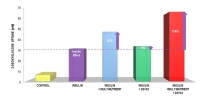Effects Of Nutrient Synergy In High Blood Sugar And Its Complications
Although many chronic health conditions increase the severity of COVID-19, it has been observed that diabetes patients are at significantly higher risk of serious disease, complications, and death from COVID-19. Currently, 1 in 11 adults in the world has diabetes, and it is estimated that by 2050 almost 1 in 3 people will have diabetes or pre-diabetes. More than 34 million Americans have diabetes and 7.5 million have pre-diabetes.
Diabetes is characterized by high levels of blood glucose resulting from defects in insulin production, insulin action, or both. Type 1 diabetes is caused by insufficient insulin production. Type 2 diabetes is associated with a condition called “insulin resistance” which means that cells are not able to respond to insulin by taking up sugar which results in high sugar levels in the blood. Sustained high blood sugar has detrimental effects on the body including promoting a vitamin C deficiency state. This relates to a structural similarity of a glucose molecule and the vitamin C molecule which is transported into the cells of the blood vessels through tiny pumps in the membranes. In a diabetic patient, these pumps are clogged by excess sugar in the blood which results in less vitamin C molecules reaching the cells. Cellular deficiency of vitamin C impairs collagen production which weakens the blood vessel walls, triggering their biological “repair” by deposition of cholesterol and plaque formation. In addition, high sugar levels in the blood causes glycation (“sugar coating”) of the cells and impairs their normal functioning. These complex sugar structures, called advanced glycation end products (AGEs), can significantly impair normal blood circulation and other organ functions when deposited inside the blood vessel walls. AGEs also induce inflammation and free radical damage of other organ systems, including nerve cells causing diabetic neuropathy.
According to Dr. Rath the primary cause of type 2 diabetes is a long-term deficiency of essential nutrients, and various scientific studies conducted at the Dr. Rath Research Institute document the efficacy of micronutrients in maintaining normal blood sugar levels particularly when applied according to nutrient synergy - the unique and innovative principle incorporated in all of Dr. Rath's research.
The most recent study published by the Dr. Rath Research Institute documents how different nutritional formulas and their combinations affect the cellular process associated with diabetes metabolism that can facilitate utilization of glucose by the cells, thereby lowering its blood levels and protecting cells from damage.1 The three formulas used in this study were: a multinutrient formula, a combination of specific minerals, and a formula containing vitamins D3 and K2. These were applied individually and in a combination. In the absence of insulin, all three formulas used individually were effective in increasing glucose uptake by skeletal muscle cells. However, their combination increased cellular glucose uptake by 450%. The formulas applied in the presence of a low dose of insulin further increased the glucose intake by the muscle cells by almost 1445% compared to control.
Nerve damage or neuropathy is one of the major complications of diabetes. The nerve cells die in the presence of AGEs. We noted that when used alone the formulas protected the nerve cells and when used in combination 80% of the cells resisted the damage caused by AGEs. This combination also increased insulin secretion by pancreatic cells by 232%.
The conventional approach to diabetes targets artificial reduction of blood glucose levels. Conversely, micronutrient supplementation helps in normalizing blood glucose levels by increasing glucose uptake by the cells. This is important for increasing bioenergy production required for normal functioning of all systems. In an earlier comparison study between micronutrients and the anti-diabetic drug metformin, we have shown that the micronutrients have similar efficacy and many additional health benefits over metformin.2 It is clear that the combination of specific micronutrients effectively acts on multiple key mechanisms of sugar metabolism, and is a natural and safe approach to manage blood sugar levels.
Ref:
1. M. Chatterjee et al., J Cell Med Nat Hlth, Mar 2022.
2. J. Cha, et al., Molecular Medicine Reports, 2011
